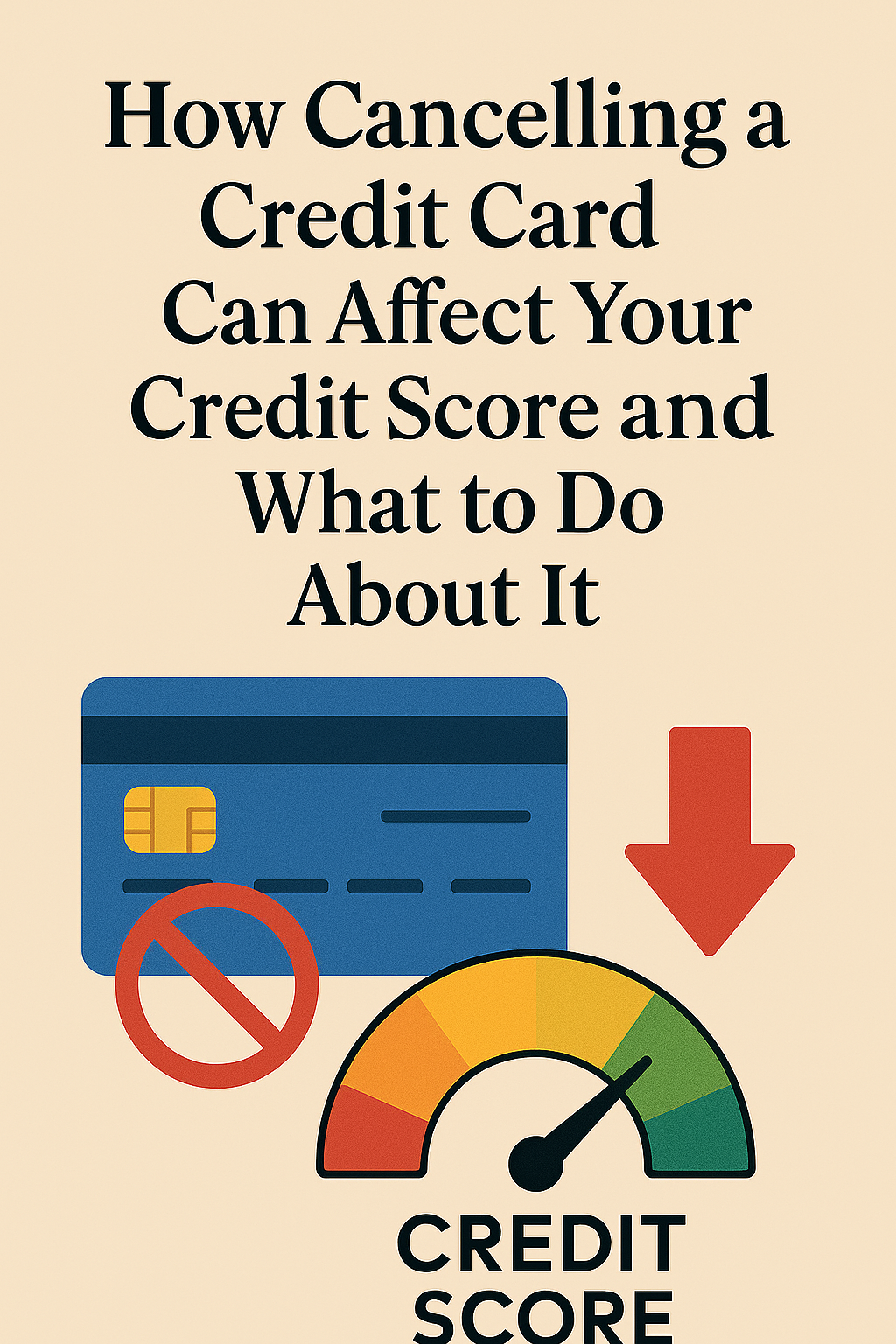Cancelling a credit card may seem like a simple financial decision—maybe you want to cut back on spending or eliminate a card you no longer use. But before you make the move, it’s crucial to understand how that choice could ripple through your financial life. One of the most common concerns is whether closing a credit card account will hurt your credit score.
The truth is, cancelling a credit card can affect your credit score, but how much depends on a few key factors. In this post, we’ll break down how your credit score is calculated, when cancelling a card might hurt or help, and what steps to take before you decide to close an account.
Let’s dive in.
Understanding How Your Credit Score Works
Before you cancel any credit card, it’s essential to know what goes into your credit score. Most credit scores are calculated using the FICO model, which considers five main factors:
1. Payment History (35%)
This is the biggest component. It shows how reliably you pay your bills. Late payments, defaults, and collections negatively impact this.
2. Amounts Owed (30%)
Also known as credit utilization, this is the ratio of your credit card balances to your total credit limits. Lower utilization is better.
3. Length Of Credit History (15%)
The longer your credit accounts have been open, the better. This includes the age of your oldest account and the average age of all accounts.
4. New Credit (10%)
This includes how many new accounts you’ve opened recently and how many hard inquiries you’ve had. Too many can lower your score.
5. Credit Mix (10%)
Lenders like to see a variety of credit types—credit cards, mortgages, car loans, etc. It shows you can manage different forms of credit.
With these in mind, let’s look at how cancelling a credit card could affect each of these areas.
How Cancelling a Credit Card Impacts Your Credit Score
Cancelling a card can impact your credit score in more than one way. Here are the major areas of concern:
Credit Utilization Ratio
This is where most of the damage occurs. Let’s say you have two cards, each with a £5,000 limit, and you carry a £2,000 balance across both. Your utilization ratio is 20% (£2,000 ÷ £10,000).
If you cancel one card, your total available credit drops to £5,000. Suddenly, your utilization ratio jumps to 40% (£2,000 ÷ £5,000), which could significantly lower your credit score.
Length Of Credit History
If you cancel one of your oldest credit cards, your average account age might decrease. This can be problematic, especially if you have a relatively short credit history to begin with.
While closed accounts still factor into your credit history for up to 10 years, their impact gradually fades over time. After they drop off your report, your average credit age could decline further.
Credit Mix and Number of Accounts
If you only have a few credit accounts open, cancelling one can reduce your credit mix and make your profile less attractive to lenders. This doesn’t usually have a huge impact, but it can still matter if you’re on the borderline of good vs. excellent credit.
Situations Where Cancelling Might Make Sense
Despite the potential downsides, there are times when cancelling a credit card is the smart thing to do.
You’re Paying High Annual Fees
If the card no longer provides enough value to justify its fee and you’re not using the perks, it might be better to cut your losses.
You’re Struggling With Overspending
If a particular card is leading to overspending and credit card debt, closing it might help you regain control—even if it causes a small credit dip.
You’re Getting Divorced Or Ending A Joint Account
Sometimes it’s necessary to close joint accounts to protect yourself from financial liabilities after a breakup or divorce.
You’re Simplifying Your Finances
Too many cards can be overwhelming. Simplifying your wallet can reduce stress, lower the risk of fraud, and make bill payments more manageable.
Just make sure you’ve considered the credit impact before pulling the plug.
What To Do Before You Cancel A Credit Card
If you’ve decided that cancelling a card is the best move, here are some important steps to take before you do it:
Pay Off the Full Balance
Make sure the balance is completely paid off before you initiate the cancellation. Don’t forget about any pending transactions or accrued interest.
Redeem Any Rewards
If the card offers points, miles, or cashback, use them before closing the account. Once the card is cancelled, those rewards usually vanish.
Consider Downgrading Instead
Many issuers offer no-fee versions of premium cards. Downgrading instead of cancelling keeps your credit limit and history intact.
Check How It Will Affect Your Utilization
If you’re carrying balances on other cards, use a credit utilization calculator to see how closing the card will affect your score.
Keep A Written Confirmation
Ask your card issuer for a written confirmation that your account has been closed and has a zero balance. This can help if there’s a dispute later.
Smart Alternatives To Cancelling A Credit Card
If you’re still unsure about closing your card, consider some of these smart alternatives that help preserve your credit score:
Keep the Card Open and Use It Occasionally
Put a small recurring charge—like a Netflix subscription—on the card and pay it off monthly. This keeps the card active without much effort.
Secure The Card And Remove It From Daily Use
If you’re tempted to overspend, take the card out of your wallet. Store it somewhere safe so you’re not tempted but still keep the account open.
Ask For A Product Change
Switch to a card with no annual fee. You keep your credit history and limit while removing the financial burden of fees.
Set Up Spending Alerts
Many credit card apps allow you to set up alerts for spending limits, payment reminders, and even location-based use to reduce risk.
Final Thoughts On Cancelling Credit Cards And Protecting Your Score
Cancelling a credit card is not a decision to take lightly. While it may feel like a responsible move, especially if you’re trying to declutter or reduce debt, it can unexpectedly damage your credit score if done without proper planning.
In most cases, the best strategy is to keep old cards open—especially those with no annual fee—and let them help you maintain a strong credit profile. However, if you’re paying excessive fees or the card is contributing to financial stress, then cancellation may be the right move.
Just remember:
- Know your current credit utilization ratio.
- Understand the age and history of your accounts.
- Consider all alternatives before cancelling.
- If you cancel, do it strategically and responsibly.
Your credit score is one of your most valuable financial tools. With the right moves, you can keep it healthy while making smart, empowered decisions about your credit cards.
Learn What I’m Using To Build Online Passive Income Streams By Clicking Here
I do not provide personal investment or financial advice and I am not a qualified licensed investment advisor. I am documenting my online investment and financial journey and what’s working for me. Click Here to read disclaimer.
Subscribe To My Newsletter And Get Inspired To Transform Your Life For The Better
“I may earn commissions as an affiliate from sponsored links within this post”






